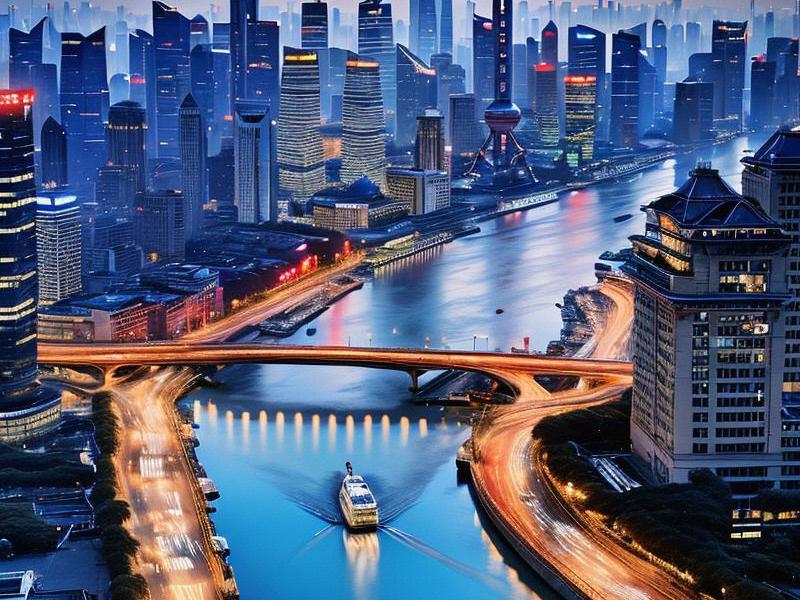
Shanghai, often referred to as the "Pearl of the Orient," is a global metropolis that seamlessly blends tradition with modernity. As one of the world's most populous cities, Shanghai is a hub for commerce, finance, culture, and innovation. Its skyline, dominated by iconic structures like the Oriental Pearl Tower and the Shanghai Tower, is a testament to its rapid urban development.
A Historical Perspective
Shanghai's history dates back over 2,400 years, but it was during the 19th century that the city began to transform into a major international port. The opening of the Treaty Ports in 1842 following the First Opium War marked the beginning of Shanghai's rise as a global trading center. This period saw the influx of various foreign influences, which have left a lasting imprint on the city's architecture, cuisine, and culture.
The Bund, a waterfront area along the Huangpu River, is a living museum of colonial architecture. Here, visitors can admire the juxtaposition of historic buildings from the early 20th century and the modern skyscrapers of Pudong across the river. The Bund's historical significance is further enriched by the nearby Yu Garden, a classical Chinese garden that offers a serene escape from the urban hustle.
Modern Shanghai
Today, Shanghai is a symbol of China's economic prowess. The city's financial district, known as Lujiazui, is home to some of the tallest buildings in the world, including the Shanghai Tower, which stands at 632 meters. This area is a hub for multinational corporations, banks, and financial institutions, making Shanghai a key player in the global economy.
The city's transportation network is another aspect of its modernity. The Shanghai Metro, one of the busiest in the world, provides efficient and convenient travel for millions of residents and tourists daily. Additionally, the Maglev train, which connects Pudong International Airport to the city center in just seven minutes, is a marvel of modern engineering.
Culturally, Shanghai is a melting pot of influences. The city boasts a vibrant arts scene, with galleries, theaters, and music venues showcasing both traditional Chinese art forms and contemporary international works. The Shanghai International Film Festival is one of the most prestigious film festivals in Asia, attracting filmmakers and audiences from around the globe.
阿拉爱上海 Surrounding Areas
While Shanghai itself is a marvel, its surrounding areas offer a diverse range of experiences that complement the city's dynamic character.
Suzhou and Wuxi
Just an hour away by high-speed train, Suzhou is renowned for its classical gardens, canals, and silk production. The city, often called the "Venice of the East," is a UNESCO World Heritage site. The Humble Administrator's Garden, one of the largest and most famous gardens in China, is a must-visit for those seeking tranquility amidst nature.
Wuxi, another nearby city, is known for its beautiful Taihu Lake, which offers opportunities for boating, fishing, and water sports. The city also has a rich cultural heritage, including the ancient town of Liyuan, which features traditional architecture and handicrafts.
Hangzhou
Approximately two hours from Shanghai by train, Hangzhou is famous for its picturesque West Lake, a UNESCO World Heritage site. The lake is surrounded by lush hills and dotted with historical sites, such as the Leifeng Pagoda and the Su Causeway. Hangzhou is also the birthplace of Dragon Well Tea, a highly prized variety of green tea.
上海龙凤419贵族 The city has a strong cultural and artistic heritage, with numerous museums, galleries, and performance venues. The West Lake Expo Park hosts various exhibitions and events, attracting visitors from all over the world.
Nanjing
Nanjing, the capital of Jiangsu Province, is located about three hours from Shanghai. Known as the "Southern Capital," Nanjing has a rich history and was the capital of several Chinese dynasties. The city is home to the Sun Yat-sen Mausoleum, the Ming Xiaoling Mausoleum, and the Confucius Temple, all of which are significant historical landmarks.
Nanjing's modern development is evident in its business districts and universities. The city is a center for research and education, with institutions like Nanjing University and Southeast University attracting students and scholars from around the globe.
Economic Growth and Innovation
Shanghai's economic growth has been nothing short of remarkable. The city is a key player in China's Belt and Road Initiative, which aims to enhance connectivity and trade between Asia, Europe, and Africa. Shanghai's free trade zones have attracted numerous multinational corporations, making it a hub for international trade and investment.
Innovation is at the heart of Shanghai's economic strategy. The Zhangjiang Hi-Tech Park is a major center for research and development in fields such as biotechnology, information technology, and new materials. The city's government has implemented policies to foster entrepreneurship and support startups, contributing to its reputation as a global innovation hub.
上海龙凤419 Cultural Heritage Preservation
Despite its rapid development, Shanghai has made significant efforts to preserve its cultural heritage. The city has numerous museums and cultural centers dedicated to showcasing its history and traditions. The Shanghai Museum, for example, is renowned for its extensive collection of Chinese art, including ancient ceramics, calligraphy, and paintings.
The city also hosts various cultural festivals throughout the year, such as the Shanghai International Arts Festival and the Shanghai Spring International Music Festival. These events provide a platform for local and international artists to showcase their talents, enriching the cultural fabric of the city.
Conclusion
Shanghai and its surrounding areas offer a unique blend of history, culture, and modernity. From the historic Bund and Yu Garden to the futuristic skyscrapers of Lujiazui, the city is a testament to China's rapid urbanization and economic growth. The surrounding areas, with their beautiful landscapes and rich cultural heritage, provide a diverse range of experiences that complement the city's dynamic character.
As Shanghai continues to evolve, it remains a beacon of innovation and a symbol of China's aspirations on the global stage. Whether you are a history enthusiast, a food lover, or a tech geek, Shanghai and its surrounding areas have something to offer for everyone.
